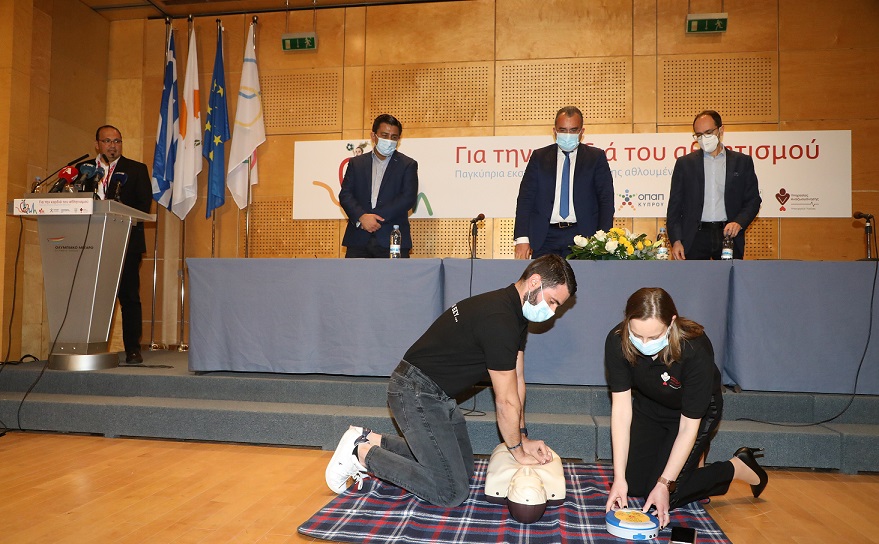The resuscitation services of the ministry of health, in collaboration with OPAP Cyprus, will start a training campaign for athletes and sports players, with the aim of teaching basic cardiopulmonary resuscitation, the use of automated external defibrillator and the treatment of choking. The need for training is dictated by international studies, which show an increase in sudden cardiac arrests in sport in recent years.
The launch of the campaign was announced by Health Minister Michalis Hadjipantelas at a press conference held at the Olympic Hall on February 25, which was also attended by OPAP Cyprus CEO Dimitris Aletraris, and Cyprus Olympic Committee President George Chrysostomou.
“The ministry of health has always acted in such a way as to safeguard and promote health as a supreme good,” noted Minister Hadjipantelas in his address, adding that officials of the ministry’s resuscitation services will conduct the training scheme using specialised, latest-technology training equipment.
The health minister pointed out that, every year in Europe, around 275,000 sudden cardiac arrests are recorded outside the hospital, including on the sports field, which had not left his ministry indifferent. Under the slogan “For the Heart of Sport”, Minister Hadjipantelas assured that: “we will make every effort to inform everyone in the sporting world in their training areas through specific training programmes”.
Finally, Minister Hadjipantelas thanked OPAP Cyprus both for its participation in the training programme and for the long and strong support it has provided to the ministry and health sector in general.
“There are many reasons that refresh our feelings for the participation of OPAP Cyprus in the training programme,” said CEO Dimitris Aletraris, in his own address. After referring to the importance of the relevant scheme and the long-standing, multi-level and, above all, close cooperation between OPAP Cyprus and the ministry of health, Aletraris recalled that OPAP Cyprus has been aware of the need to address the problem of sudden deaths in sports venues since 2006. It had decided then to provide the first automatic external defibrillators (AED) and make them available, in cooperation with the Cyprus Sports Organisation, at sports venues.
Two years later, and with the enactment of the 2008 Law on the Installation and Use of Automatic External Defibrillators, OPAP Cyprus, as Aletraris recalled, contributed to the further alignment of sports venues with the relevant legislation via a new supply of defibrillators. In addition to this, OPAP Cyprus has, he noted, from time to time, supported small and distant communities with an AED to address the needs of their residents.
“In the fight for health” concluded the OPAP Cyprus CEO, “we are all fellow athletes and we must work responsibly for the best possible outcome for the benefit of athletes, fans and all the people of our society.” He assured Minister Hadjipantelas that OPAP Cyprus would continue to support the highest good of all: health.
For his part, Cyprus Olympic Committee (COC) President, George Chrysostomou, assured that the COC and its member Federations would do everything necessary to ensure the training campaign will be of maximum benefit, to prevent and address unpleasant health consequences in sports venues.
The Committee, Chrysostomou stressed, has put health at the top of its priorities, and has an obligation to provide a safe environment for athletes and generally all those involved in sport. He further expressed his satisfaction that the health ministry’s initiative was again being implemented with the support of OPAP Cyprus, which, he said, is the main pillar of all sports activities and institutions of our country.
The first phase of the training programme will be attended by athletes and coaches from the Cyprus Football Federation, the Cyprus Basketball Federation, the Cyprus Pet Football Federation and the Cyprus Handball Federation.
The duration of each briefing will not exceed 40 minutes and will include mandatory practical training of participants. At the same time, in a bid to strengthen the whole campaign, health ministry officials have already intensified on-site checks of the automated external defibrillators at the sports venues.






Click here to change your cookie preferences